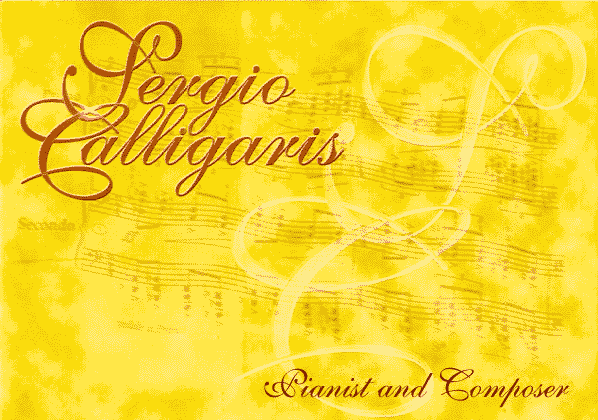 MUSICA E SCUOLA, Year 14th - Nr.18
MUSICA E SCUOLA, Year 14th - Nr.18
(Gioiosa Editrice - Sannicandro Garganico, FG)
October 2000 (page 6):
The interview - Sergio Calligaris,
by Adriano Bassi
I met Maestro Sergio Calligaris in Milan, the day after the performance of his work
"Toccata, Adagio and Fugue", performed by the Orchestra Milano Classica
conducted by Vittorio Parisi at Palazzina Liberty.
Calligaris is undoubtedly a solar, real person, who's bursting with pleasantness and
concreteness in all his words.
We were at the head office of Carisch Publisher, which takes care of Maestro's production,
sitting down in a quiet and well ventiled little hall. The description of the setting in
which the interview took place is important, because the reader must become a third
presence of the dialogue into action.
About Maestro's style, it's possible summarizing his research in a deep rereading of music
come before us, with his own personal enrichment, succeeding in creation of a perfect
bridge of connection between past and present, and producing sonorities and sound
"alchemies" not joined to sterile labels as "neo-romanticism" or an
extremely dimishing background of a composer's research.
Calligaris must be heard at least twice a piece, acquired and in this way only one can
understand that besides his stature of composer there's his true research not subordinate
to market. After this, let's start on our interview.
I would like to know your thought about the neoromantic tendency, which seems to
label the whole production of these last years.
When talking about neoromantic tendency I remind what Michelangelo Zurletti said with
regard to this aspect and which finds me perfectly in agreement: that is my music isn't
neoromantic, because it follows a very rigorous and counterpointistic form. Formally it
can go back to a very developed classicism as Beethoven's to Brahms' one, and rather to
Bach about counterpoint. Therefore, it isn't neoromantic. Regarding my opinion about
neoromanticism, it seems to me that all is based on a melody accompanied by a functional
and very complete harmony. In my music, instead, it exists a more complex construction,
where one can find, through analysis, a series of altered chords which can digress into
atonality.
It seems important to me make the reader understand your style and your research.
I love symmetry because of performance, and I do be a very practical man, therefore I
like having a scheme to follow also going beyond this aspect but having at disposal a
starting basis. Then everything can be dilated as in Bruckner, but there's something
important: symmetry is for me what compensates for the harmonic and melodic inventiveness,
because it's reassuring. I think that in a composer must exist a basic element, that is
the presence of a personality beyond labels, that I don't like.
What do you think about performing tradition?
That's a delicate word to be used. "Routine" isn't tradition. I'm bored when
I listen to predictable pianists, who make catch on straight away what will follow. I
like, instead, listening to pianists who bring out through the dynamic accent some music
aspects which aren't based on highlighting melody only, neglecting harmony. In this way,
by means of using both harmony and melody, an interesting and fashinating compactness
arises. Without using fantasy and personality, taking care of tradition only, one gets
just an amorphous, stupid and indistinct performance.
How do you choose ensembles to write for?
Many times according to errands of works by some soloists, groups or institutions.
Moreover some artists, later becoming addressees of my compositions, inspired me a certain
type of piece already arising with that character. For example, I wrote for the Magna
Grecia Society a piece for two pianos and orchestra for the Duo Gemmiti, two pianists of
strength and granitic technique and, since I do be a pianist of strength, I got a perfect
inspiration in creating my piece. This work was already born in my mind with that sound
and then enthusiasm makes the rest.
Your opinion about the world of composition in Italy.
My adjustment into this sector wasn't easy, because mentality of musicians is based on
one's origin. They think according to the criterion of the schools. For instance, these
composers of the roman school studied with this teacher, the other ones with another
system. I came from abroad with a very solid training and I've been considered as an
"outsider", therefore I've been labelled like this. I accepted it although it
didn't make me happy, because I consider me Italian and I'm very fond of Italy. I've noted
a provincial, closed and worrying mentality. At first, I thought they didn't like my
presence, then I understood they don't even love each other and, instead, they deeply hate
each other. I already know that my comment is a bit drastic.
But isn't there a research into action?
A research of what? We have the complex of novelty at all costs. An author's
personality is not painting green hair or something similar, therefore a composer
revoluzionizes music inside, not writing pieces using forks or spoons in the name of an
originality that he knows himself (in his mind or heart depths - although many are shy
about talking of heart) it doesn't exist. He doesn't want to follow already covered paths.
Many contemporaries don't understand that some effects they use, as the
"fluttering" of flutes or the "puffing" sound of trombone have been
made thousands of times as Bellini's arpeggiato accompaniment. There's a lot of dialectics
and lots of chatter.
Our interview comes to an end with a vigorous handshake and the promise to meet soon
again to understand if neoromanticism will go on. All the best, Maestro Calligaris!
Adriano Bassi

